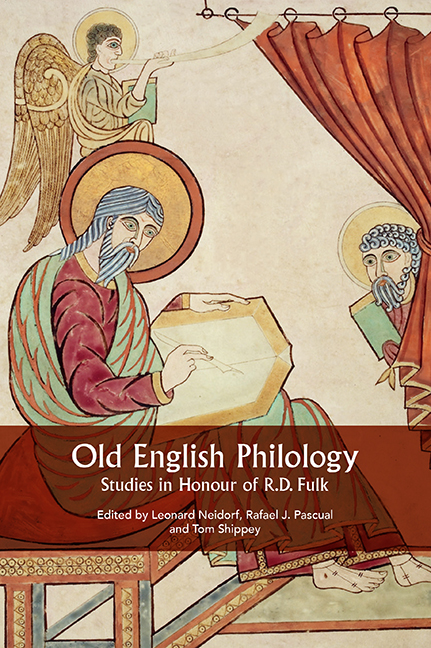Book contents
- Frontmatter
- Contents
- List of Illustrations
- Acknowledgements
- List of Contributors
- Introduction: R.D. Fulk and the Progress of Philology
- 1 Sievers, Bliss, Fulk, and Old English Metrical Theory
- 2 Ictus as Stress or Length: The Effect of Tempo
- 3 Metrical Criteria for the Emendation of Old English Poetic Texts
- 4 The Suppression of the Subjunctive in Beowulf: A Metrical Explanation
- 5 Metrical Complexity and Verse Placement in Beowulf
- 6 Alliterating Finite Verbs and the Origin of Rank in Old English Poetry
- 7 Prosody-Meter Correspondences in Late Old English and Poema Morale
- 8 The Syntax of Old English Poetry and the Dating of Beowulf
- 9 The Anglo-Saxons and Superbia: Finding a Word for it
- 10 Old English gelōme, gelōma, Modern English loom, lame, and Their Kin
- 11 Worm: A Lexical Approach to the Beowulf Manuscript
- 12 Wulfstan, Episcopal Authority, and the Handbook for the Use of a Confessor
- 13 Some Observations on e-caudata in Old English Texts
- 14 The Poetics of Poetic Words in Old English
- 15 Dream of the Rood 9b: A Cross as an Angel?
- 16 The Fate of Lot’s Wife: A ‘Canterbury School’ Gloss in Genesis A
- 17 Metrical Alternation in The Fortunes of Men
- 18 The Originality of Andreas
- 19 The Economy of Beowulf
- 20 Beowulf Studies from Tolkien to Fulk
- The Writings of R.D. Fulk
- Index
- Tabula Gratulatoria
- Anglo-Saxon Studies
19 - The Economy of Beowulf
Published online by Cambridge University Press: 29 May 2021
- Frontmatter
- Contents
- List of Illustrations
- Acknowledgements
- List of Contributors
- Introduction: R.D. Fulk and the Progress of Philology
- 1 Sievers, Bliss, Fulk, and Old English Metrical Theory
- 2 Ictus as Stress or Length: The Effect of Tempo
- 3 Metrical Criteria for the Emendation of Old English Poetic Texts
- 4 The Suppression of the Subjunctive in Beowulf: A Metrical Explanation
- 5 Metrical Complexity and Verse Placement in Beowulf
- 6 Alliterating Finite Verbs and the Origin of Rank in Old English Poetry
- 7 Prosody-Meter Correspondences in Late Old English and Poema Morale
- 8 The Syntax of Old English Poetry and the Dating of Beowulf
- 9 The Anglo-Saxons and Superbia: Finding a Word for it
- 10 Old English gelōme, gelōma, Modern English loom, lame, and Their Kin
- 11 Worm: A Lexical Approach to the Beowulf Manuscript
- 12 Wulfstan, Episcopal Authority, and the Handbook for the Use of a Confessor
- 13 Some Observations on e-caudata in Old English Texts
- 14 The Poetics of Poetic Words in Old English
- 15 Dream of the Rood 9b: A Cross as an Angel?
- 16 The Fate of Lot’s Wife: A ‘Canterbury School’ Gloss in Genesis A
- 17 Metrical Alternation in The Fortunes of Men
- 18 The Originality of Andreas
- 19 The Economy of Beowulf
- 20 Beowulf Studies from Tolkien to Fulk
- The Writings of R.D. Fulk
- Index
- Tabula Gratulatoria
- Anglo-Saxon Studies
Summary
The world of Beowulf is one which glitters and shines with treasure. At too many points to list here, the poet dwells over the intricacies of swords, neck-rings, helmets, and other objects. Such passages contribute to the poem's famously rich texture, and fine objects also fulfill a powerful role in the society imagined by the Beowulf poet. It is not enough for the characters in the poem to have a weapon or a reward: the poet spins out the details of the items, moving beyond their appearance and quality to their significance for the human actors in the poem. Tellingly, the wide range of forty or so words used to describe treasure includes some (such as gestrēon and frætwe) which also touch etymologically and semantically on reproduction and life-forces (Taylor 1986). Rich objects become invested with a value that runs deeper than their considerable material worth. In themselves, they are frequently tools of war and feasting – central activities of elite life, at least as portrayed in the poem – but also serve as physical embodiments of memory and honor: they recall occasions of giving and the fates of previous owners, for the benefit of both the current holder and those around them. Making a gift of treasure was more than simply a reward for good service; it built the personal bonds and shared memories which were supposed to hold society together (Bazelmans 1999 and 2000; Hill 1982 and 1996; Thieme 1996; cf. Bjork 1994). Thus Unferth shows his recognition of Beowulf's capabilities with a gift of his own sword, Hrunting (cf. Baker 2013, 77–102), while the watchman who protects Beowulf's ship on the Danish coast receives a gold-bound sword for his efforts, þæt hē syðtan wæs on meodubence māþme þȳ weortra, yrfelāfe (1901b–4a: “so that after that on the mead-bench he was the worthier for that precious thing, that rich legacy”).
All use, abuse, or abandonment of such treasure speaks to its ability to shape human motivations and interactions. This social significance of treasure in Beowulf is well known (Leisi 1953; Cherniss 1972, esp. ch. 4; Greenfield 1974; Silber 1977; Creed 1989; Tarzia 1989; SurberMeyer 1994; Van Meter 1996).
- Type
- Chapter
- Information
- Old English PhilologyStudies in Honour of R.D. Fulk, pp. 371 - 391Publisher: Boydell & BrewerPrint publication year: 2016

